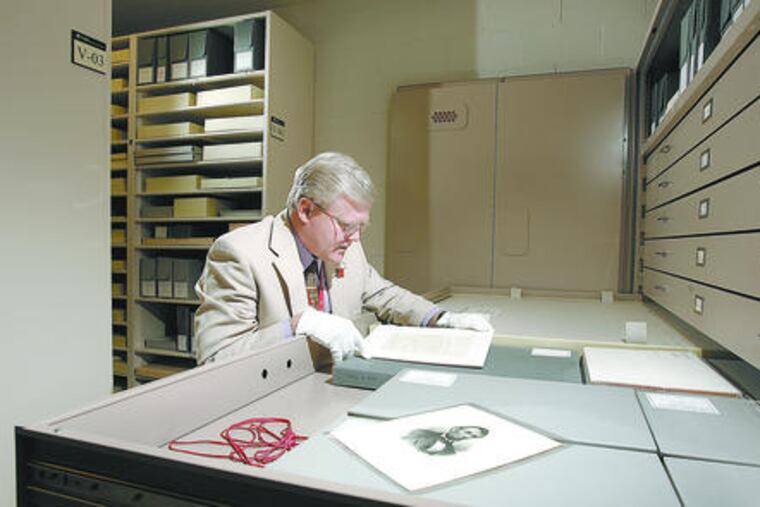Despite past, New Jersey joins in fete for Lincoln
He lost the popular vote in New Jersey in two presidential elections, and was assailed by a future governor as the "original gorilla" and a "well-meaning baboon."

He lost the popular vote in New Jersey in two presidential elections, and was assailed by a future governor as the "original gorilla" and a "well-meaning baboon."
The president-elect was also savaged by New Jersey legislators, who ridiculed his height when he addressed them in Trenton. One lawmaker offered a resolution describing him as "the ugliest man in the country."
But New Jersey today looks more kindly on Abraham Lincoln.
Gov. Corzine has issued an executive order creating a commission to arrange events honoring the 16th president next year, the bicentennial of his Feb. 12 birth. Pennsylvania and other states have formed similar commissions.
In New Jersey, the state library plans to raise money in February through Lincoln "Pennies for Peace" donations to help build schools and libraries in Pakistan.
Lincoln also will get his due in the schools as teachers fashion lessons and programs that recall his life. And Lincoln-related documents are expected to be displayed at the New Jersey State Archives in Trenton.
In Pennsylvania, a Lincoln Day scheduled for Feb. 11 in Harrisburg will include art exhibits, a Civil War encampment, and Civil War music at the state Capitol.
In Gettysburg, the David Wills House, where Lincoln spent the night before his Gettysburg Address, will be reopened as a museum Feb. 12.
"Lincoln is widely regarded by historians as our greatest president," said Marc Mappen, executive director of the New Jersey Historical Commission. "I think New Jersey came to admire Lincoln and realize what he had done.
"There was a great outflowing of crowds to watch his funeral train pass through New Jersey. He guided the country through its greatest crisis. Thanks to his leadership, the nation was united for what he described as 'a new birth of freedom.' "
The bicentennial provides "a particularly good teachable moment," New Jersey State Librarian Norma Blake said. "It's a good time to have the children think about the importance of education to themselves and others."
"When Lincoln addressed the General Assembly, he said, 'The man does not live who is more devoted to peace than I am.' Our 'Pennies for Peace' project ties together with that."
The program is part of efforts started by Greg Mortenson, coauthor and subject of
Three Cups of Tea: One Man's Mission to Promote Peace . . . One School at a Time
, to encourage peace through education in remote areas of Pakistan and Afghanistan.
Residents will be encouraged to donate pennies at the circulation desks of more than 300 public and school libraries across the state.
Lincoln is also going to receive greater attention in New Jersey classrooms.
"Studying historical figures like Lincoln is in the core curriculum, but this is obviously a special year of celebration," state Education Commissioner Lucille Davy said.
"Students can do some community services connected to Lincoln, maybe researching their own community to see what it was like when Lincoln was president. We want to focus on good character and citizenship."
Davy said the schools "can easily run essay contests. There might be art or poster contests . . . PowerPoint presentations and videos. There are lots of ways to recognize and celebrate this occasion."
While Lincoln was widely supported in most Northern states, including Pennsylvania, he was reviled in New Jersey. His name and the antislavery Republican brand were so unpopular the state party referred to itself as the Opposition party in the election of 1860, Mappen said.
Lincoln clearly understood the opposition facing him when he addressed the state's Senate and General Assembly separately on Feb. 21, 1861. New Jersey's invitation to Lincoln and his letter agreeing to speak are in the state's archives.
"Received, as I am, by the members of a Legislature the majority of whom do not agree with me in political sentiments, I trust that I may have their assistance in piloting the ship of State through this voyage, surrounded by perils as it is; for, if it should suffer attack now, there will be no pilot ever needed for another voyage," Lincoln told the General Assembly.
He gave a similar message to the Senate, noting that its members "did not think I was the man."
When war broke out after the election, Lincoln turned to Gen. George McClellan to lead the Union Army of the Potomac. But the commander - who would one day serve as New Jersey governor - often criticized the president, referring to him as "the original gorilla" and once keeping him waiting at his headquarters while he took a nap.
Lincoln later removed him from command, and McClellan, of Orange, N.J., ran for president as a Democrat in 1864, winning the state's popular vote but losing the election.
"There is a general consensus over the past 100 years that Lincoln was a great president," said Karl Niederer, director of the New Jersey State Archives.
"But it wasn't evident during the Civil War. Leading the nation through its most difficult trial and becoming the first president killed in office" raised his stature, Niederer added. "When all was said and done, he stepped up to the challenge and got us through."